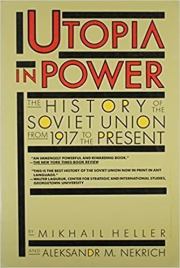Mikhail Geller - Utopia in Power
 | Название: | Utopia in Power |
Автор: | Mikhail Geller | |
Жанр: | Старинная литература | |
Изадано в серии: | неизвестно | |
Издательство: | неизвестно | |
Год издания: | 1988 | |
ISBN: | неизвестно | |
Отзывы: | Комментировать | |
Рейтинг: | ||
Поделись книгой с друзьями! Помощь сайту: донат на оплату сервера | ||
Краткое содержание книги "Utopia in Power"
From time immemorial history has been written by the victors. "Woe to the vanquished," said the ancient Romans, by which they implied not only that the vanquished may be exterminated or turned into slaves but that the conquerors write the history of their wars; the victors take possession of the past and establish their control over the collective memory. George Orwell, perhaps the only Western writer who profoundly understood the essence of the Soviet world, devised this precise and pitiless formula: "Whoever controls the past controls the future." Orwell was not the first to say this, though. Mikhail Pokrovsky, the first Soviet Marxist historian, anticipated Orwell when he wrote that history is politics applied to the past.
Читаем онлайн "Utopia in Power". Главная страница.
- 1
- 2
- 3
- . . .
- последняя (317) »
UTOPIA
IN .
POWER
A HISTORY OF THE USSR
FROM 1917 TO THE PRESENT
MICHEL HELLER &
ALEKSANDR NEKRICH
Anyone remotely concerned with Russia will have to read this book'
- Edward Cranks/raw
V
UTOPIA
—IN
PfeWER
THE HISTORY OF THE SOVIET UNION FROM 1917 TO THE PRESENT
MIKHAIL HELLER
Translated from the Russian by Phyllis B. Carlos
Hutchinson
London • Melbourne • Auckland • Johannesburg
AND
First published in 1982 by Calam-Levy (Paris)
Copyright 1985 by Mikhail Heller and Aleksandr Nekrich
All rights reserved
This edition first published in 1986 by
Hutchinson Ltd, an imprint of Century Hutchinson Ltd.
Brookmount House, 62-65 Chandos Place, London WC2N 4NW.
Century Hutchinson Publishing Group (Australia) Pty Ltd
PO Box 496, 16-22 Church Street Hawthorn, Melbourne, Victoria 3122
Century Hutchinson Group (NZ) Ltd
PO Box 40-086 . 32-34 View Road Glenfield, Auckland 10
Century Hutchinson Group (SA) Pty Ltd
PO Box 337, Berglvei 2012 South Africa
British Library Cataloguing in Publication Data
Heller, Mikhail
Utopia in power: a history of the USSR from 1917 to the present. 1. Soviet Union—History—1917- I. Title II. Nekrich, Aleksandr III. L'Utopie au pouvoir. English 947.084 DK266
ISBN 0 09 155620 1 cloth 0 09 155621 x pbk
CONTENTS
ACKNOWLEDGMENTS 7
INTRODUCTION 9
LIST OF ACRONYMS AND ABBREVIATIONS 13
Chapter 1. BEFORE OCTOBER 1917 15
Chapter 2. FROM THE REALM OF NECESSITY TO THE REALM
OF FREEDOM, 1918-1920 50
Chapter 3. THE SEARCH FOR A "GENERAL LINE," 1921-1925 111
Chapter 4. IN PURSUIT OF CONFLICT, 1926-1928 201
Chapter 5. THE GREAT RUPTURE, 1929-1934 222
Chapter 6. SOCIALISM "ACHIEVED AND WON," 1935-1938 277
Chapter 7. ON THE BRINK, 1939-1941 316
Chapter 8. THE WAR, 1941-1945 370
Chapter 9. THE TWILIGHT OF THE STALIN ERA, 1945-1953 450
Chapter 10. CONFUSION AND HOPE, 1953-1964 512
Chapter 11. "REAL SOCIALISM": THE BREZHNEV ERA,
1965-1982 603
Chapter 12. AFTER BREZHNEV, 1982-1985 702
CONCLUSION 729
CHRONOLOGY 733
NOTES 758
BIBLIOGRAPHY 820
INDEX 846
ACKNOWLEDGMENTS
My contribution to this book was written at the Russian Research Center of Harvard University, where I enjoyed the stimulating conversation and encouragement of an unusually congenial group of colleagues. I would also like to thank the National Endowment for the Humanities, the Ford Foundation, and the American Council of Learned Societies for their support of various portions of this work. Finally, I would like to thank Steven Jones for his valuable contribution in preparing the final version of the English translation.
Aleksandr M. Nekrich
INTRODUCTION
The man of the future is the one who will have
the longest memory.
FRIEDRICH NIETZSCHE
From time immemorial history has been written by the victors. "Woe to the vanquished," said the ancient Romans, by which they implied not only that the vanquished may be exterminated or turned into slaves but that the conquerors write the history of their wars; the victors take possession of the past and establish their control over the collective memory. George Orwell, perhaps the only Western writer who profoundly understood the essence of the Soviet world, devised this precise and pitiless formula: "Whoever controls the past controls the future." Orwell was not the first to say this, though. Mikhail Pokrovsky, the first Soviet Marxist historian, anticipated Orwell when he wrote that history is politics applied to the past.
The history of the Soviet Union is not just another example confirming the general rule. In this case history was placed at the service of the state to the greatest possible extent and in the most conscious, systematic way. After the October revolution not only the means of production were nationalized but all spheres of existence, and above all, memory, history.
Memory makes us human. Without it people are turned into a formless mass that can be shaped into anything the controllers of the past desire. Count Alexander Benckendorff, a Baltic-German nobleman and Russia's first chief of gendarmes under Tsar Nicholas I, advised this approach to history: "Russia's past is admirable; its present more than magnificent; as for its future, it is beyond the grasp of the most daring imagination; it is from this point of view... that Russian history must be conceived and written." The chief of gendarmes was convinced of the correctness of his view. So was Maxim Gorky, the leading Soviet writer under Joseph Stalin, who said: "We must know everything that happened in the past, not in the way it has been written about heretofore; but rather, in the way it appears in the light of the doctrine of Marx-Engels-Lenin-Stalin."
Benckendorff's worthy suggestions seem to have been adopted and grafted onto the Marxist-Leninist-Stalinist doctrine, with the result that the Soviet people were successfully deprived of their social memory. In the decades after the Bolshevik revolution an unparalleled expertise was developed in manipulating the past and controlling history. Not only was the history of the Soviet Union controlled and manipulated; the history of Russia and of the nations which had been part of the Russian empire suffered as well. Soviet textbooks begin the history of the Union of Soviet Socialist Republics, founded in 1922, with the ancient Armenian kingdom of Urartu. Thus, it would seem that the triumphal march to the radiant heights of mature socialism began on the shores of Lake Van in the ninth century B.C.
Many Western historians who verbally reject the official viewpoint of Soviet historiography in fact accept it. They find the sources of the 1917 revolution in the internecine warfare of the Kievan princes, the Tatar yoke, the atrocities of Ivan the
--">- 1
- 2
- 3
- . . .
- последняя (317) »


